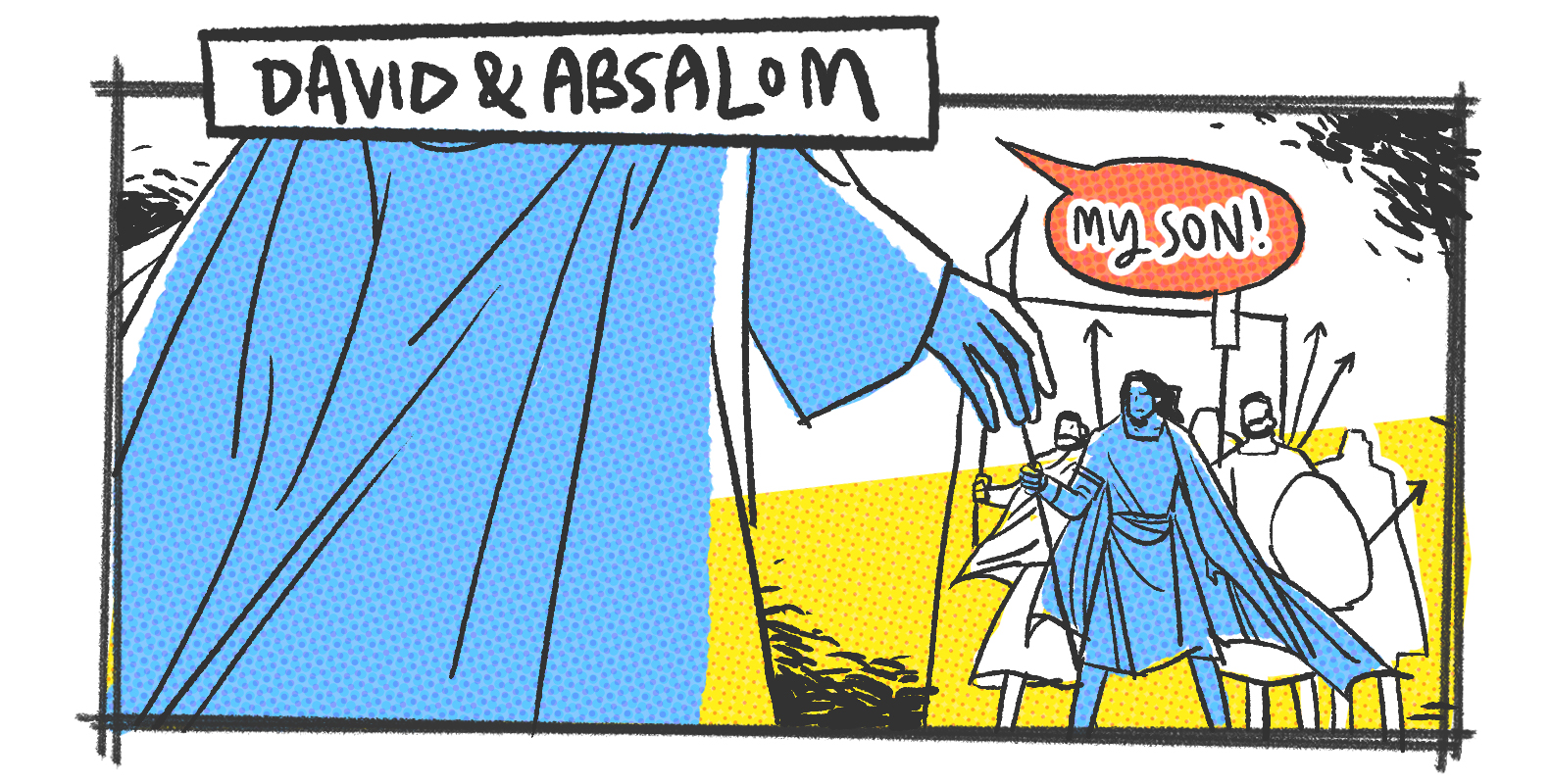What’s your relationship with your father like?
Do you have an “Asian Dad” who doesn’t say much, but shows his love in other – often more awkward – ways? Or do you have a dad who fills your day with dad jokes and pranks?
Maybe you don’t have a good relationship with your dad. Or maybe dad’s not around anymore — but you have a father figure in your life who loves you just as deeply.
We all have different relationships with our fathers. They’re not always picture-perfect and that’s okay. Even fathers in the Bible had a rough time relating with their kids (and vice versa)!
As I looked at the different relationships fathers had with their children in the Bible, I realised the imperfections in my relationship with my own father aren’t all that bad, in the sense that these imperfections point me back to the perfect relationship I have with my Heavenly Father.
So let’s take a look at some of these not-so-normal father-child relationships in the Bible. I hope they will similarly encourage you to appreciate your own unique relationship with your father this Father’s Day!
THE FATHER WHO PLAYED FAVOURITES
I’d say many of us have read about Jacob’s exceeding love for his son Joseph.
Jacob loved Joseph more than any of his other sons and even made a luxurious robe just for him (Genesis 37:3).
Some of us may be like Joseph, who received such doting love from our own fathers.
But some of us may be like Joseph’s older brothers, who envied the special treatment he received from their father.
What’s the right response in such an unfortunate situation? Joseph’s brother, Judah, gives us a clue.

While Jacob shouldn’t have been playing favourites in the first place, as children we can find encouragement through Judah who stepped out to honour and obey his father despite his obvious display of favouritism.
Much later, after Joseph had gone from prison to palace and risen through the ranks to become Pharoah’s right hand man, he set a test for his brothers who had come to Egypt for assistance.
Long story short, wanting to see if his brothers had changed or not since he was sold off, Joseph made it look like Benjamin — Jacob’s new favourite after Joseph “died” — would have to be detained after a palace goblet that had been planted in his sack was found.
Hearing this, Judah immediately requested to be imprisoned instead of Benjamin (Genesis 44:33-34).
This was a far cry from his younger days when he mooted the brothers should sell Joseph to traders instead of killing him (37:26).
As I read this passage, I saw that even though Judah knew he wasn’t his father’s favourite, he realised it would surely break his father’s heart to have Benjamin taken away.
Rather than acting from a place of bitterness as he had once did with Joseph, he decided to honour his father and protect Benjamin whom his father loved.
Judah didn’t desire to be the “favourite child”. He wasn’t competing or striving for approval. Rather, I think he demonstrated a sacrificial form of love that was motivated by knowing what was in his father’s heart.
So, just like Judah, perhaps we can seek out what is close to our father’s hearts and honour that.
When we do so sacrificially and selflessly, I believe it will make for a powerful testament to God’s love working in us.
REBELLIOUS CHILD, GRACIOUS FATHER
If Solomon was David’s star child, you can consider Absalom to be the opposite. He went against his dad’s wishes and ways in almost every way possible, including sleeping with his father’s concubines.
Yet despite Absalom’s rebelliousness, David continued to love his son deeply and showed grace and mercy towards him.
What if we aimed for reconciliation with our fathers instead of rebellion? What if we chose grace?
When Absalom murdered his brother and ran away from home, rather than being angry at him, David only longed to see Absalom once again (2 Samuel 13:39). And when Absalom had finally returned home, rather than punishing him, David gave him a kiss (2 Samuel 14:33).
Absalom had even staged a coup against his own father, yet David had asked his men to deal with Absalom “gently” (2 Samuel 18:5).
Hearing of Absalom’s death, David grieved immensely saying that he wished he could take his place (2 Samuel 18:33).

I wonder: if Absalom had truly grasped his father’s heart and understood how much David loved him, would their relationship have turned out differently? Maybe he wouldn’t continued rebelling.
Like Absalom, some of us may also be living a life oblivious to the grace and love our father has shown us.
Rather than continuing our rebellious streak as Absalom had, perhaps we can choose better.
What if we aimed for reconciliation with our fathers instead of rebellion? What if we chose grace?
THE FATHER AND SON WHO FOUGHT A LOT
Of course, not all fathers may act so graciously and lovingly as David had.
Saul was not known for being a gentle and gracious father. Much of his relationship with his son, Jonathan, was filled with conflict and tension, mainly due to their clashing opinions about David.
Saul wanted David dead, but Jonathan did not (1 Samuel 19:1).
As a result, Jonathan would confront his father about his evil plans and even secretly foiled some of them!

Not all of us have the smoothest relationships with our fathers. There will come times when our opinions differ, as Saul and Jonathan experienced — maybe even arguments to be had, for the sake of what is right before God’s eyes.
But what I admired about Jonathan and Saul’s relationship was this: despite their disagreements, Jonathan continued to stay by his father’s side.
Jonathan was loyal to the end. Even after all their arguments, Jonathan fought and died together with his father on the battlefield (1 Samuel 31:8).
Jonathan showed us how to be a true friend and godly son.
Learning from his example, how we can show honour and loyalty to our parents especially when there are differences and conflicts?
THE FOSTER FATHER
Of course, the Bible doesn’t only feature father-son relationships, there are also father-daughter relationships like Mordecai and Esther.
What makes this father-daughter duo extra special? Mordecai was Esther’s adoptive father (Esther 2:7).
Mordecai raised Esther after her biological parents died, showing kindness to her. Even after Esther was taken in by the king, Mordecai would lovingly wait nearby just to find out how she’s doing (Esther 2:11).
Esther would likewise care for Mordecai’s well-being too, such as ensuring he was properly clothed (Esther 4:4).

God puts us in positions, and people in our lives, for His purposes. We see that most clearly in Esther and Mordecai.
If not for the relationship they shared, with Mordecai as Esther’s foster father and advisor of sorts, Esther might have never been able to fulfil her destiny.
For instance, Mordecai persuaded Esther to meet with the king on behalf of the Jews, even though it put her life at risk.
Mordecai reminded her that Esther had risen to her royal position for such a time as this (Esther 4:11). Following his advice, Esther fulfilled her destiny and helped to save the day.
Like Esther, we may have a foster father or a father figure in our own lives. Who are the older ones around us helping us fulfil our God-given assignment and destiny?
They may not be our “real” fathers, but we can find comfort and assurance in the knowledge that they have been sovereignly placed by God in our lives for such a time this.
EARTHLY FATHER, HEAVENLY FATHER
Last but definitely not least, we have Joseph and Jesus!
While Jesus was not Joseph’s biological child, Joseph had always treated Jesus as his own son. He raised Jesus with Mary and took up the responsibilities of a father and husband.
Though Jesus had always known that His Father is God in heaven, Jesus still regarded and respected Joseph as His earthly father (Luke 2:49-51).
Jesus obeyed His earthly parents while honouring and doing the will of God the Father at the same time.

How might we imitate Jesus’ example? And as we obey and honour our fathers, how might we bring glory to our Heavenly Father?
This Father’s Day, let’s celebrate the unique relationships we have been blessed with in our dads. Let’s honour them for who they are and for the roles they play in our lives.
Whether it’s through gifts, quality time or loving words — let’s put a smile on their face this weekend!
And as we do so, let’s honour our Heavenly Father above all.
For more stories on the relationships we share with our dads, here are some that will encourage you this Father’s Day!
- What does being a father mean to you?
- How does the Bible describe fatherhood?
- Thank your dad this Father’s Day. Tell him, in your own special way, that you love him.
- Say a prayer for your dad or father figure (bonus points if you do so in person!).
- Last but not least, thank God for being your Heavenly Father!









